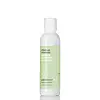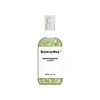What's inside
What's inside
 Key Ingredients
Key Ingredients

 Benefits
Benefits

 Concerns
Concerns

 Ingredients Side-by-side
Ingredients Side-by-side

Aloe Barbadensis Leaf Juice
Skin ConditioningCoco-Glucoside
CleansingDecyl Glucoside
CleansingHelianthus Annuus Seed Oil
EmollientGlycerin
HumectantSodium Cocoyl Glutamate
CleansingLeuconostoc/Radish Root Ferment Filtrate
AntimicrobialSalix Alba Bark Extract
AstringentPopulus Tremuloides Bark Extract
AntiseborrhoeicPersea Gratissima Oil
Skin ConditioningCocos Nucifera Fruit Extract
EmollientCucumis Sativus Fruit Extract
EmollientCamellia Sinensis Leaf Extract
AntimicrobialCitrus Aurantium Bergamia Fruit Extract
Skin ConditioningCitrus Limon Peel Extract
EmollientPyrus Malus Fruit Extract
Skin ConditioningRubus Idaeus Fruit Extract
AstringentSalvia Officinalis Leaf Extract
CleansingVaccinium Macrocarpon Fruit Extract
AstringentRosmarinus Officinalis Leaf Extract
AntimicrobialVanilla Planifolia Fruit Extract
Skin ConditioningLavandula Angustifolia Flower/Leaf/Stem Extract
MaskingSalvia Sclarea Extract
AntiseborrhoeicSorbitan Oleate Decylglucoside Crosspolymer
CleansingTriethyl Citrate
MaskingXanthan Gum
EmulsifyingLactobacillus
Skin ConditioningSodium Anisate
AntimicrobialLevulinic Acid
PerfumingSodium Levulinate
Skin ConditioningCitric Acid
BufferingAloe Barbadensis Leaf Juice, Coco-Glucoside, Decyl Glucoside, Helianthus Annuus Seed Oil, Glycerin, Sodium Cocoyl Glutamate, Leuconostoc/Radish Root Ferment Filtrate, Salix Alba Bark Extract, Populus Tremuloides Bark Extract, Persea Gratissima Oil, Cocos Nucifera Fruit Extract, Cucumis Sativus Fruit Extract, Camellia Sinensis Leaf Extract, Citrus Aurantium Bergamia Fruit Extract, Citrus Limon Peel Extract, Pyrus Malus Fruit Extract, Rubus Idaeus Fruit Extract, Salvia Officinalis Leaf Extract, Vaccinium Macrocarpon Fruit Extract, Rosmarinus Officinalis Leaf Extract, Vanilla Planifolia Fruit Extract, Lavandula Angustifolia Flower/Leaf/Stem Extract, Salvia Sclarea Extract, Sorbitan Oleate Decylglucoside Crosspolymer, Triethyl Citrate, Xanthan Gum, Lactobacillus, Sodium Anisate, Levulinic Acid, Sodium Levulinate, Citric Acid
Water
Skin ConditioningDecyl Glucoside
CleansingGlycereth-18 Ethylhexanoate
Skin ConditioningGlycerin
HumectantSorbitan Oleate Decylglucoside Crosspolymer
CleansingActinidia Chinensis Fruit Juice
Skin ConditioningCamellia Sinensis Leaf Extract
AntimicrobialLavandula Angustifolia Flower/Leaf/Stem Extract
MaskingPrunus Persica Fruit Extract
AbrasiveLeuconostoc/Radish Root Ferment Filtrate
AntimicrobialMelia Azadirachta Leaf Extract
Skin ConditioningCitrus Limon Peel Extract
EmollientCocos Nucifera Fruit Extract
EmollientPrunus Serotina Fruit Extract
MaskingPyrus Malus Fruit Extract
Skin ConditioningRosmarinus Officinalis Leaf Extract
AntimicrobialRubus Idaeus Fruit Extract
AstringentSalvia Officinalis Leaf Extract
CleansingSalvia Sclarea Extract
AntiseborrhoeicVaccinium Macrocarpon Fruit Extract
AstringentVanilla Planifolia Fruit Extract
Skin ConditioningCoco-Glucoside
CleansingDisodium Coco-Glucoside Citrate
EmulsifyingGlyceryl Oleate
EmollientXanthan Gum
EmulsifyingGlycereth-18
HumectantButylene Glycol
HumectantSodium Levulinate
Skin ConditioningPotassium Sorbate
PreservativeDisodium EDTA
Sodium Ascorbyl Phosphate
AntioxidantTrifolium Pratense Extract
Skin ConditioningIsomalt
HumectantCitric Acid
BufferingTriethyl Citrate
Masking1,2-Hexanediol
Skin ConditioningAgar
MaskingCalcium Alginate
MaskingGellan Gum
Phenoxyethanol
PreservativePropylene Glycol
HumectantMelia Azadirachta Flower Extract
Skin ConditioningChamomilla Recutita Flower Extract
MaskingPhytol
EmollientMica
Cosmetic ColorantTitanium Dioxide
Cosmetic ColorantWater, Decyl Glucoside, Glycereth-18 Ethylhexanoate, Glycerin, Sorbitan Oleate Decylglucoside Crosspolymer, Actinidia Chinensis Fruit Juice, Camellia Sinensis Leaf Extract, Lavandula Angustifolia Flower/Leaf/Stem Extract, Prunus Persica Fruit Extract, Leuconostoc/Radish Root Ferment Filtrate, Melia Azadirachta Leaf Extract, Citrus Limon Peel Extract, Cocos Nucifera Fruit Extract, Prunus Serotina Fruit Extract, Pyrus Malus Fruit Extract, Rosmarinus Officinalis Leaf Extract, Rubus Idaeus Fruit Extract, Salvia Officinalis Leaf Extract, Salvia Sclarea Extract, Vaccinium Macrocarpon Fruit Extract, Vanilla Planifolia Fruit Extract, Coco-Glucoside, Disodium Coco-Glucoside Citrate, Glyceryl Oleate, Xanthan Gum, Glycereth-18, Butylene Glycol, Sodium Levulinate, Potassium Sorbate, Disodium EDTA, Sodium Ascorbyl Phosphate, Trifolium Pratense Extract, Isomalt, Citric Acid, Triethyl Citrate, 1,2-Hexanediol, Agar, Calcium Alginate, Gellan Gum, Phenoxyethanol, Propylene Glycol, Melia Azadirachta Flower Extract, Chamomilla Recutita Flower Extract, Phytol, Mica, Titanium Dioxide
Ingredients Explained
These ingredients are found in both products.
Ingredients higher up in an ingredient list are typically present in a larger amount.
Camellia Sinensis Leaf Extract is derived from the leaves of the tea plant. Black tea, green tea, and oolong tea are all harvested from this plant.
This ingredient has many skin benefits:
This ingredient contains polyphenols, a strong antioxidant. Antioxidants help fight off molecules that damage skin cells.
On top of that, the antioxidants in green tea neutralize free-radicals from the sun. This gives the skin some extra UV protection, but should not replace sunscreen.
Many components of tea have anti-inflammatory properties.
Polyphenols and L-theanine help soothe the skin and reduce irritation. The caffeine in Camellia Sinensis Leaf Extract helps calm inflamed blood vessels.
Other compounds found in tea include: Vitamin Bs, linoleic acid, magnesium, calcium, iron, and zinc.
Research has shown both drinking Camellia Sinensis Leaf Tea and applying it to the skin can help boost skin elasticity and hydration. Studies also show using tea extract may reduce sebum, or oil, production.
Learn more about Camellia Sinensis Leaf ExtractCitric Acid is an alpha hydroxy acid (AHA) naturally found in citrus fruits like oranges, lemons, and limes.
Like other AHAs, citric acid can exfoliate skin by breaking down the bonds that hold dead skin cells together. This helps reveal smoother and brighter skin underneath.
However, this exfoliating effect only happens at high concentrations (20%) which can be hard to find in cosmetic products.
Due to this, citric acid is usually included in small amounts as a pH adjuster. This helps keep products slightly more acidic and compatible with skin's natural pH.
In skincare formulas, citric acid can:
While it can provide some skin benefits, research shows lactic acid and glycolic acid are generally more effective and less irritating exfoliants.
Most citric acid used in skincare today is made by fermenting sugars (usually from molasses). This synthetic version is identical to the natural citrus form but easier to stabilize and use in formulations.
Read more about some other popular AHA's here:
Learn more about Citric AcidCitrus Limon Peel Extract is created from the peel of a lemon. Lemon peels contain Vitamin C. Lemon peels also exhibit antibacterial, antioxidant, and antifungal properties.
Coco-Glucoside is a surfactant, or a cleansing ingredient. It is made from glucose and coconut oil.
Surfactants help gather dirt, oil, and other pollutants from your skin to be rinsed away.
This ingredient is considered gentle and non-comedogenic. However, it may still be irritating for some.
Learn more about Coco-GlucosideCocos Nucifera Fruit Extract comes from the meat of the coconut fruit. It is an emollient and skin conditioner with antioxidant properties.
Coconut fruit is naturally rich in amino acids, sugars, and nutrients including Vitamin C and small amounts of vitamin B. Malic acid can also be found in coconut fruit extract.
Decyl Glucoside is a glucose-based surfactant and emulsion stabilizer. It is created by reacting glucose with the fatty acids from plants.
Surfactants help clean the skin by trapping oil, sebum, and dirt to be washed away. As an emulsion stabilizer, it stabilizes the ingredients in a product by preventing them from separating.
This ingredient is biodegradable and non-toxic. This ingredient is commonly found in baby shampoos.
Decyl Glucoside is sometimes used to stabilize the UV filter Tinosorb.
Learn more about Decyl GlucosideGlycerin is already naturally found in your skin. It helps moisturize and protect your skin.
A study from 2016 found glycerin to be more effective as a humectant than AHAs and hyaluronic acid.
As a humectant, it helps the skin stay hydrated by pulling moisture to your skin. The low molecular weight of glycerin allows it to pull moisture into the deeper layers of your skin.
Hydrated skin improves your skin barrier; Your skin barrier helps protect against irritants and bacteria.
Glycerin has also been found to have antimicrobial and antiviral properties. Due to these properties, glycerin is often used in wound and burn treatments.
In cosmetics, glycerin is usually derived from plants such as soybean or palm. However, it can also be sourced from animals, such as tallow or animal fat.
This ingredient is organic, colorless, odorless, and non-toxic.
Glycerin is the name for this ingredient in American English. British English uses Glycerol/Glycerine.
Learn more about GlycerinThis ingredient comes from the lavender plant. It is used to add a scent or mask an unpleasant one in products.
Lavender contains linalool and linalyl acetate.
When exposed to air, these two compounds become strong allergens. This ingredient exhibits cytotoxicity at low concentrations; amounts of 0.25% have been shown to damage skin cells.
Learn more about Lavandula Angustifolia Flower/Leaf/Stem ExtractLeuconostoc/Radish Root Ferment Filtrate is a natural preservative. It comes from fermenting radish roots with a bacteria called leuconostoc.
Leuconostoc comes from lactic acid.
This ingredient has antimicrobial properties and helps prevent the growth of bacteria in a product.
Leuconostoc is used to make the traditional Korean side-dish, kimchi. It is also used to make sourdough bread (both incredibly yummy foods).
Learn more about Leuconostoc/Radish Root Ferment FiltratePyrus Malus Fruit Extract is extract from Apples. Apples are rich in Vitamin C, sugars, and antioxidants.
The sugar in Apples are humectants and help hydrate the skin. On top of that, apples also contain some acids, such as malic acid. These acids may have a mild exfoliating effect.
Last, the phytochemicals found in apples are strong antioxidants. These antioxidants help with anti-aging as they protect your skin cells against oxidative damage.
Learn more about Pyrus Malus Fruit ExtractRosmarinus Officinalis Leaf Extract comes from rosemary. Rosemary is native to the Mediterranean.
While Rosmarinus Officinalis Leaf Oil can be volatile due to its fragrant properties, the fragrance components are usually removed in the leaf extract.
Rosemary Leaf Extract contains many antioxidants such as rosmarinic acid and caffeic acid. Rosemarinic acid, a compound found in rosemary leaf, has been found to help soothe skin conditions such as eczema and acne.
Learn more about Rosmarinus Officinalis Leaf ExtractWe don't have a description for Rubus Idaeus Fruit Extract yet.
Sage leaf extract is a culinary and medicinal herb with antibacterial, antioxidant, and soothing properties.
This ingredient is made up of 75-90% ursolic acid, a potent antioxidant and anti-inflammatory compound.
We don't have a description for Salvia Sclarea Extract yet.
Sodium levulinate is the a sodium salt of Levulinic Acid. If dissolved in an aqueous solution, the two ingredients become identical.
It is a skin conditioning agent, meaning it helps soften and hydrate your skin.
According to Cosmetic Ingredient Review, the highest amounts of sodium levulinate are found in mouthwashes at 0.62%.
Learn more about Sodium LevulinateSorbitan Oleate Decylglucoside Crosspolymer is also known as Poly Suga®Mulse D9 (We'll call is SODC for short).
SODC is a nonionic fragrance solubilizer. A solubilizer blends small amounts of oils into water-based formulas. It is especially good at solubilizing fragrances in water-only systems.
SODC does not contain PEGs. It is hydrophilic, meaning it has the tendency to mix with water.
In products, SODC acts as an emulsifer by blending waters and oils.
Learn more about Sorbitan Oleate Decylglucoside CrosspolymerTriethyl Citrate comes from citric acid. It has masking, perfuming, and solvent properties. As a solvent, this ingredient helps disperse ingredients evenly in skincare.
One manufacturer claims this ingredient can:
According to perfume manufacturers, this ingredient is almost odorless but has a mild fruity, wine and plum scent. It can be used to mask the scent of other ingredients.
This ingredient can be plant-sourced or synthetic; it can naturally be found in cabbage and white wine.
Learn more about Triethyl CitrateVaccinium Macrocarpon Fruit Extract comes from the cranberry fruit. Vaccinium Macrocarpon is the North American species of cranberries native to eastern Canada.
As an astringent, cranberry extract helps tighten the pores by constricting the cells.
Cranberries contain Vitamin E and Vitamin C, both potent antioxidants. It also contains minerals such as manganese and copper.
Learn more about Vaccinium Macrocarpon Fruit ExtractVanilla Planifolia Fruit Extract comes from the vanilla orchid native to central America. It is a skin-soothing ingredient.
This ingredient is skin-soothing and contains polyphenols that give it antioxidant properties.
This ingredient is not known to sensitize or irritate skin (unlike Vanilla Tahitensis). Vanilla tahitensis has shown to irritate skin in low amounts.
Learn more about Vanilla Planifolia Fruit ExtractXanthan gum is used as a stabilizer and thickener within cosmetic products. It helps give products a sticky, thick feeling - preventing them from being too runny.
On the technical side of things, xanthan gum is a polysaccharide - a combination consisting of multiple sugar molecules bonded together.
Xanthan gum is a pretty common and great ingredient. It is a natural, non-toxic, non-irritating ingredient that is also commonly used in food products.
Learn more about Xanthan Gum